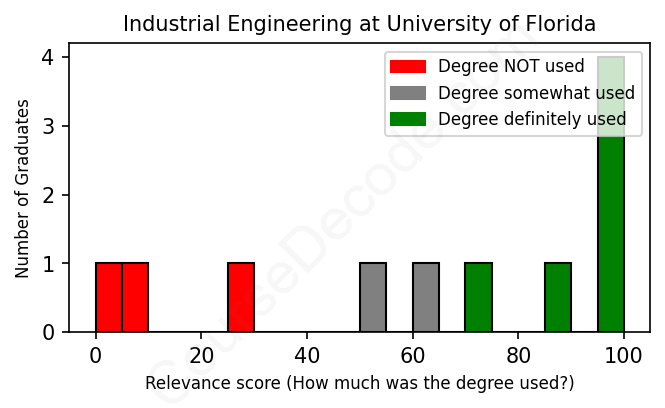
First, some facts. Of the Industrial Engineering graduates from University of Florida we've analyzed , here's how many have used (or NOT used) their degree in their career:

These are estimates based on AI analysis of 11 LinkedIn profiles (see below).
The verdict? Slightly below average. Overall, with an average relevance score of 64%, Industrial Engineering graduates from University of Florida have a slightly lower likelihood (-3%) of finding work in this field compared to the average graduate across all fields:
And for comparison, here's the chart for all profiles we've looked at across all degrees.
Also, after graduating, only 9% of these graduates have pursued further education other than another Bachelor's degree (such as a Masters degree or other), compared to the average across all profiles of 35%. This suggests a Bachelors degree is enough for most Industrial Engineering graduates, and it's normal to look for work straight after graduation.
See the details:
|
Relevance score: 100% We think this person has gone into a career highly relevant to their degree. We think this person has gone into a career highly relevant to their degree.
DEGREE INFOGraduated in 2018 from University of Florida with a Bachelor of Science - BS in Industrial Engineering. No other secondary education since. JOB HISTORY SINCE GRADUATIONPower Delivery Intern Florida Power & Light Company May 2018 - Aug 2018 Distribution Engineer  Florida Power & Light Company Jan 2019 - Apr 2022 Engineer I - Power Delivery Diagnostic Center  Florida Power & Light Company Apr 2022 - Present ABOUTNo information provided. |
The top 10 most common jobs done by the graduates we've analyzed (ranked most common to least) are:
When looking at the job history of Industrial Engineering graduates from the University of Florida, it’s pretty clear that there's a mixed bag of roles. Some graduates have landed jobs that are spot-on related to Industrial Engineering, like Operations Engineers or Industrial Engineers, where they’re directly applying the skills they learned to optimize processes and improve efficiency. These types of positions are great because they really make use of their education and training, helping companies streamline operations and enhance productivity.
However, on the flip side, many graduates ended up in roles that don't really tap into their Industrial Engineering background. Positions like claims adjusters, project coordinators, or sales engineers might use some of the problem-solving skills from their education, but they don’t necessarily require a deep understanding of Industrial Engineering concepts. This kind of scattershot career path shows that while some graduates found their ideal fits in engineering-centric roles, others are applying their knowledge more indirectly or even stepping completely outside their core area of study. It’s a reminder that having a degree doesn’t always mean you’ll end up in the field you trained for, and that’s okay—it just reflects a broader job market and diverse set of opportunities!
Here is a visual representation of the most common words in job titles for Industrial Engineering graduates (this is across all Industrial Engineering graduates we've analyzed, not just those who went to University of Florida):

Looking at the career trajectories of Industrial Engineering graduates from the University of Florida, it’s clear that many are landing solid positions right out of school. For their first jobs, a significant number of graduates have started out in roles that leverage their engineering backgrounds, such as operations engineers, project coordinators, and even technical specialists. These initial roles often offer a valuable blend of experience in management, technical skills, and industry-specific knowledge, setting a strong foundation for their career growth.
As we look five to ten years down the line, many of these graduates progress into higher positions within their organizations or even move to new companies. By 5 years, common roles include team leaders, managers, or specialized engineers in fields like healthcare, energy, and consulting. After ten years, it’s not uncommon to see them in senior management roles or even leading significant projects in their companies. There's a noticeable trend towards positions that are directly related to Industrial Engineering, which suggests that these graduates are generally doing well in securing relevant careers rather than straying into unrelated fields. Overall, it seems that a degree in Industrial Engineering from the University of Florida can lead to a promising career path with plenty of opportunities for advancement.
Getting a Bachelor’s degree in Industrial Engineering at the University of Florida can be pretty challenging, but it’s not impossible—just like any other engineering program, it has its tough spots. You'll dive into a mix of math, statistics, and some serious problem-solving skills, which can be a bit intense, especially if you're not super comfortable with those subjects. Plus, there's a fair amount of teamwork and projects involved, so you’ll need to balance your own learning with collaborating with others. Overall, it might be harder than some other degrees out there, but if you’re passionate about it and willing to put in the effort, you'll learn a lot and make it through just fine!
Most commonly, in the LinkedIn profiles we've looked at, it takes people 4 years to finish a Bachelor degree in Industrial Engineering.
Looking at the job histories of these Industrial Engineering grads from the University of Florida, it seems like they’ve generally landed solid positions that are likely to pay decent salaries. Many of them have climbed the ladder pretty quickly, especially those who’ve worked at big companies like GE and Cvent, where the pay scales tend to be pretty competitive. Plus, the roles they've held, like Senior Materials Planning Manager or Senior Consultant, typically come with good compensation packages. Even the more entry-level roles, like at Florida Power & Light, show a clear trajectory toward better pay over time. Overall, they seem to be doing well financially—definitely not struggling to make ends meet!
Here is a visual representation of the most common words seen in the "about" section of LinkedIn profiles who have a Bachelor degree in Industrial Engineering (this is across all Industrial Engineering graduates we've analyzed, not just those who went to University of Florida). This may or may not be useful:

Here are all colleges offering a Bachelor degree in Industrial Engineering (ordered by the average relevance score of their Industrial Engineering graduates, best to worst) where we have analyzed at least 10 of their graduates:
| College | Score | Count |
|---|---|---|
 Iowa State University Iowa State University
|
88 | 11 |
 North Carolina State University North Carolina State University
|
87 | 12 |
 California Polytechnic State University-San Luis Obispo California Polytechnic State University-San Luis Obispo
|
87 | 15 |
 Texas A&M University Texas A&M University
|
83 | 39 |
 Purdue University Purdue University
|
81 | 36 |
 University of Central Florida University of Central Florida
|
80 | 23 |
 Georgia Institute of Technology Georgia Institute of Technology
|
80 | 59 |
 Penn State University Penn State University
|
79 | 16 |
 Texas Tech University Texas Tech University
|
79 | 10 |
 University of Pittsburgh University of Pittsburgh
|
79 | 15 |
 University of Washington University of Washington
|
78 | 12 |
 University of Arkansas University of Arkansas
|
78 | 11 |
 University of Wisconsin-Madison University of Wisconsin-Madison
|
76 | 13 |
 University of Illinois at Urbana-Champaign University of Illinois at Urbana-Champaign
|
73 | 15 |
 West Virginia University West Virginia University
|
71 | 19 |
 Clemson University Clemson University
|
69 | 23 |
 University of Florida University of Florida
|
64 | 11 |